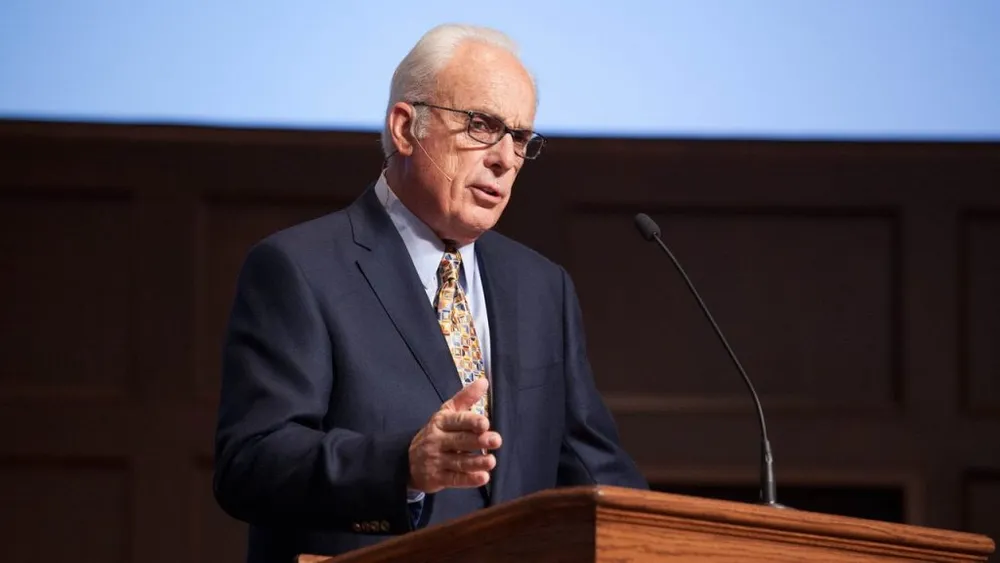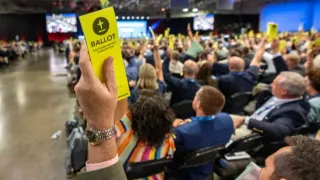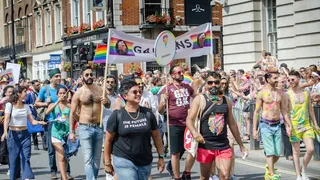The Legacy of John MacArthur

The Legacy of John MacArthur: Virtue and Faithfulness
Today the evangelical world mourns the loss of Pastor John MacArthur, a monumental figure in the conservative evangelical movement for more than five decades. Known most for his unwavering commitment to the authority of Scripture, MacArthur preached through the entire New Testament, authored over 30 books, and sold more than one million copies of his study Bible. He served as president of both a college and a seminary, and his radio preaching is heard daily on more than 2,500 stations around the world.
Yet MacArthur was not the rhinestone cowboy many celebrity preachers aspire to be—he was the real deal. He never set out to be popular. At one point, he said, “You cannot be faithful and popular, so take your pick.” Even so, he became widely respected among Christians across the globe. It is clear that God was at work in MacArthur’s life from a young age.
Life and Calling
John Fullerton MacArthur Jr. was born on June 19, 1939, to Jack and Irene MacArthur. He grew up in a home deeply rooted in ministry, with both his father and grandfather serving as pastors. MacArthur later described his upbringing as stable. His parents had a strong relationship, his mother stayed at home, and he and his three sisters were raised in a close-knit household. After his grandfather passed away in 1950, the family lived with his grandmother, with whom John shared a room. He was often sick as a child and tended to get into mostly harmless mischief, but by high school he had become an athlete, participating in several sports, with a particular focus on football. That was about to change, however.
A life-altering car accident during his time at Bob Jones University gave John MacArthur a new perspective. God had spared his life after he was thrown from a car and his body slid down the road. He knew he wanted to live for the Lord, but he was uncertain whether that would mean pursuing professional ministry or continuing with football. In 1959, he transferred to Pacific College in Los Angeles, where he continued his education and was even named to an All-America squad as a halfback. However, his direction shifted toward ministry after a pivotal encounter with a paralyzed girl named Polly. She had lost the will to live, and at the request of a friend, MacArthur visited her in the hospital. When he walked into her room, he told her that her spiritual condition mattered more than her physical condition. This conversation played a significant role in her conversion and became a defining moment in MacArthur’s own decision to enter the ministry.
Ministry and Achievement
He began attending Talbot Theological Seminary in 1961 and graduated magna cum laude in 1964. During his time there, he married Patricia Sue Smith, whose family attended Calvary Bible Church in Burbank, where his father was the pastor. In 1968, he received a call to become the pastor of Grace Community Church in Sun Valley. This came at a pivotal moment in the history of Los Angeles, as the Jesus Movement was gaining momentum and the San Fernando Valley was experiencing significant economic growth. Grace Community Church grew during this time, in part due to these cultural and economic factors, but its growth was not the result of formulas or trends. Instead, it was rooted in MacArthur’s unwavering focus on deep, expository preaching and the pursuit of personal holiness. He consistently gave credit to God’s providence for the church’s growth—and successful it was.
In 1969, the tape ministry began with a single volunteer, Vern Lummus. By 1970, 5,000 sermon tapes had been produced, and by 1973 that number had grown to 37,000, supported by a team of six volunteers. By 1976, annual production had reached 110,000 tapes. As the ministry expanded, so did the church facilities. In 1972, the original chapel was replaced with one that seated 1,000 people, and in 1977, a new auditorium was built to accommodate 3,000. Moody Monthly once referred to Grace Community Church as “The Church of Nine Hundred Ministers,” a reflection of the large number of volunteers actively serving in various ministries. This strong volunteer base enabled MacArthur to devote approximately 30 hours each week to study, allowing him to preach with depth and clarity. By the 1980s, the influence of Grace Community Church had grown further, with the establishment of the Shepherd’s Conference, The Master’s College, and The Master’s Seminary, all connected to John MacArthur’s leadership.
Opposition and Virtue
During his 56 years as pastor at Grace Community church, John MacArthur also received opposition both internal and external as he waded into controversies over things like biblical counseling, Lordship Salvation, the Charismatic Movement, and the Social Justice Movement. In a 2019 chapel at The Master’s Seminary MacArthur reflected:
“You wind up at the end of your life having been stripped of people who, at some point, gave in to the other side, and the ranks get thinner and thinner. I am sort of living in that era. I am living in an era, on one hand, as a shepherd and a pastor, where I have 50 years of loving people who have filled my life with so much love, and so much kindness, and so much affection that it is just beyond comprehension. And that is Grace Church, and that is the people who hear the Word of God and believe it and follow it. But, on the other hand, I watch my life, as it comes to an end, being stripped of relationships with many, many evangelical leaders, because, at some point, they are unwilling to stand where I stand.”
For me, this has become an incredible encouragement, because it validates virtue over fashion, optics, and managerialism. MacArthur was able to reintroduce church discipline, popularize expository preaching, and bring doctrinal clarity to many important issues, even though it cost him. There were days, he admitted, when he would have rather been digging ditches, but his commitment to God and his responsibility to his church kept him going and allowed him to experience the deep joy of serving others, and this was only possible because of his foundation. MacArthur once said, “The greatest privilege of my ministry is not the time I spend with people. It’s the time I spend with Him,” and also, “I have often said that my concern is the depth of my ministry: God will take care of the breadth of it.”
It is important to realize that John MacArthur was not a formula for ministry success, nor was he an exegetical robot. He was not in love with abstractions or content to live like a hermit tucked away in some ivory tower. He loved God, and he loved people—real people—the kind you encounter in everyday life. He gave up national stages to be with the people he knew, and he watched as volunteers took what he preached and projected it farther than he ever could, though that was never the plan. It was precisely because he never took himself too seriously that he was able to endure threats, even when they came at great personal cost.
It should also be noted that the threats MacArthur focused on were the ones he believed posed a danger to his congregation. He did not preach the newspaper, nor did he seek the international spotlight, even though, at times, that spotlight found him. Though he was famously uninvolved in Religious Right activism, near the end of his life he publicly challenged California Governor Gavin Newsom on COVID policies and abortion. In 2015, he preached a widely discussed sermon opposing same-sex wedding ceremonies, and he even suggested that Christians should vote for President Trump in order to preserve public morality. MacArthur’s instincts on public issues were, more often than not, grounded in biblical conviction and shaped by a heritage of Christian virtue.
If someone wants to be like John MacArthur, the way to do it is not by turning him into a ministry formula or by attending his institutions—it is by being like Jesus.
In Remembrance
MacArthur’s influence is deeply personal for me, because I likely would not exist without his ministry. My parents met at Grace Community Church, where my father served as a College/Career leader and a deacon. Scott Harris was part of the second graduating class of The Master’s Seminary in 1987. Growing up, whenever we visited California—where my grandparents lived just a fifteen-minute walk from Grace Community Church—I thought of MacArthur simply as my parents’ former pastor, not as a celebrity of any kind. During the social justice controversy, it was encouraging to receive a note from him that said, “To Jon, a faithful warrior.” I will always cherish that, since he was one of the few willing to confront the issue and work to drive it from the church. For me, a part of both evangelical and Los Angeles history has passed, and there is no one who can replace him. His stable presence remains with us through his sermons, where I know I will always find the truth of Scripture communicated verse by verse.
We will never hear his voice, save in recorded form, this side of heaven. But Pastor John MacArthur is with the Savior he loved and using that very voice in praise and adoration. Well done, and welcome home.
“For we do not preach ourselves, but Christ Jesus as Lord, and ourselves as your bond-servants on account of Jesus. For God, who said, ‘Light shall shine out of darkness,’ is the One who has shone in our hearts to give the Light of the knowledge of the glory of God in the face of Christ. But we have this treasure in earthen containers, so that the extraordinary greatness of the power will be of God and not from ourselves.” 2 Cor 4:5-7
Sources are from my reading of John MacArthur: Servant of the Word and Flock by Ian Murray and also my years of experience listening to John MacArthur sermons, attending The Master's Seminary, and hearing stories about him.
Related Articles
Lindsay Whitlow | 7/12/2025
An Open Letter to Chip and Joanna Gaines
But kindness is not kind at all if it’s telling a lie.
Vanessa Hunt | 7/11/2025
Toxic Town: Five Tactics of Prideful Leaders
Toxic! Five Tactics of Prideful Leaders
John Rosemond | 7/5/2025
A Good Life Begins With Britches That Fit!
As usual, the ENTIRE mental health professional community was WRONG about self-esteem!
Michael Clary | 6/23/2025
The Status Quo Convention: Six Takeaways from Dallas
I was really discouraged last year. But this year, I’m not. Reform efforts take years.
Rosaria Butterfield & Jared Moore | 6/19/2025
Yes, God is 'Anti-Gay'
The God of the Bible is anti-gay, and the gods of this world are pro-gay.
Mike Edwards | 6/5/2025
Dear Brandon Lake, Bubba Ain’t as Dumb as You Think
A Response to Brandon Lake’s Worship Philosophy





